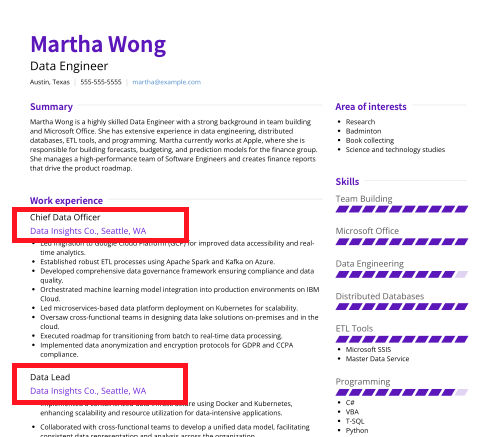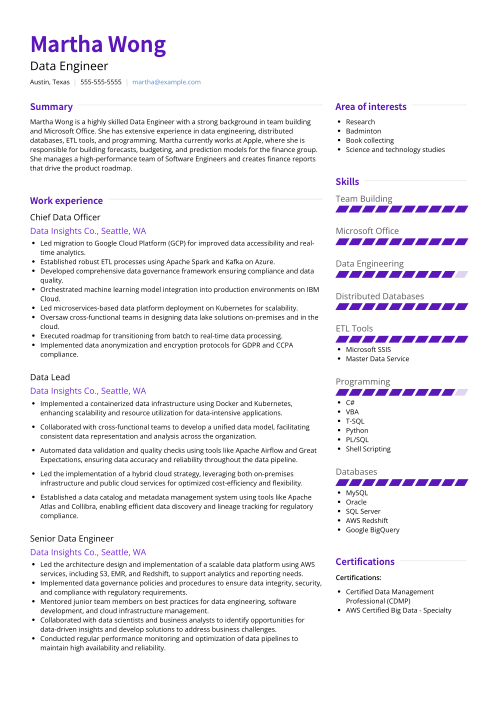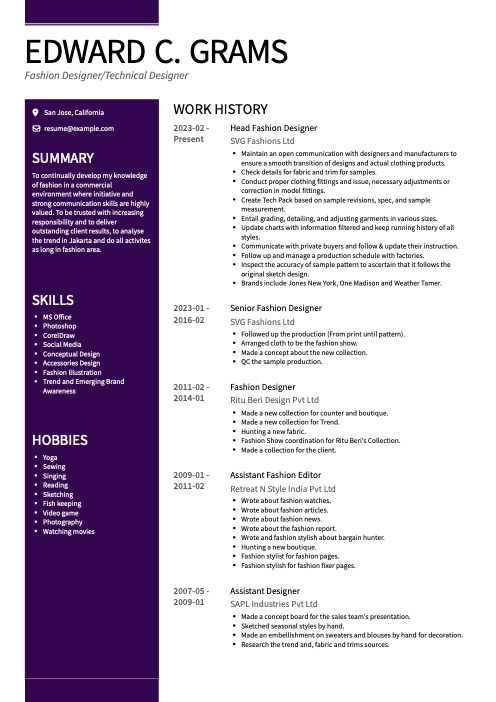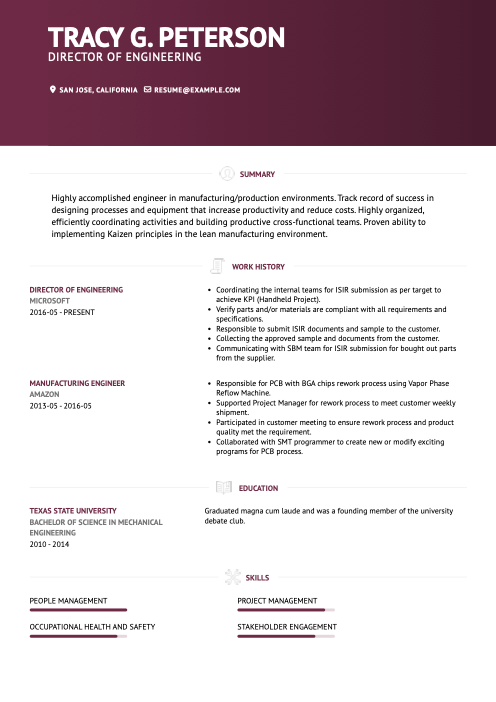
Internal Position Resume: How to Write, Templates, Tips, & Examples

Moving up within your company can be a smart choice. You already know how things work and what is expected in different roles.
An internal resume highlights what you've achieved and what you're good at within the company, showing why you're the right person for the new job. Let's talk about how to make a great internal resume for a job inside the company, so you can get an interview and win the role you want!
What is an Internal Resume?
An internal resume is an employee's resume that highlights their skills, experiences, and achievements for potential job openings, promotions, or project assignments within the company. It's crafted to position an employee for potential career advancement, promotions, lateral moves, or project assignments within the organization.
An internal resume is great for showing how your skills match up with what's needed in another department or role within the company. An internal resume highlights your successes within the company, teamwork, and how you've helped the company reach its goals, all to make a strong case for your move to a new role.
Internal Position Resume Example

Internal Promotion Resume Example

Resume for an Internal Position Example

How to Write an Internal Resume
Writing an internal resume involves a strategic focus on your contributions within your current company. Here's how you can effectively put one together:
- Introduction: Clearly express interest in the new role and commitment to further contributing to the company.
- Current Position: Describe your role, emphasizing key responsibilities and accomplishments.
- Skills and Accomplishments: Highlight relevant skills and align them with the new role's requirements.
- Internal Achievements: Showcase awards, recognition, or positive feedback received from colleagues or management.
- Career Progression: Summarize your journey, emphasizing promotions, increased responsibilities, and contributions.
- Education and Training: List relevant degrees, certifications, or training enhancing your qualifications.
- References: Optionally, include internal references supporting your abilities and performance.
- Moving Up in a Senior Role: Focus on leadership, strategic thinking, and past successes, envisioning the future of the department or team.
- Career Transition within the Company: Tailor your resume to highlight transferable skills, adaptability, and commitment to contributing value in the new position. Demonstrate understanding of the role's requirements and how your background positions you for success.
Writing an internal resume using these tips can help you stand out by showcasing that you are a tailored fit for the new role within the company, emphasizing internal achievements and career progression, thus demonstrating your commitment and readiness for advancement.
How to List Your Work Experience on Internal Resume
To write an impactful work experience for an internal candidate resume, consider the following:
- Showcase Impact: Highlight quantifiable achievements and contributions within the company to demonstrate your value.
- Clear Descriptions: Provide concise and clear descriptions of your responsibilities and accomplishments in previous roles.
- Align with New Role: Ensure that your past experiences align with the requirements and expectations of the new position.
- Demonstrate Growth: Illustrate your career progression and any initiatives taken to develop skills or take on additional responsibilities.
- Highlight Leadership and Collaboration: Emphasize instances where you demonstrated leadership, innovation, and teamwork.
- Avoid Jargon: Use language that is easily understandable to hiring managers outside of your specific department or field.
- Tailor to Company Culture: Reflect the values and culture of the company in your work experience descriptions.
- Provide Context: Include relevant context for each experience to help hiring managers understand the significance of your contributions.
Related: How to list multiple positions from the same company on resume.
How to List Your Accomplishments on an Internal Resume
When listing accomplishments on your internal resume, focus on specific achievements relevant to the job you're applying for. Include results that show how you've improved processes, enhanced productivity, or contributed to the company's goals.
For example, "Increased departmental efficiency by 20% through streamlining workflow processes".
List Relevant Top Skills on Your Internal Resume
On your internal resume, list skills that directly align with the job you want. Include hard skills like software proficiency or technical expertise and soft skills like leadership or communication.
For instance, if you're applying to a managerial position, highlight skills like "team leadership," "conflict resolution," and "strategic planning." Present these skills in a clear, concise manner.
How to Customize Your Existing Resume for an Internal Position
To customize your existing resume for an internal position:
- Analyze Job Description: Scrutinize the internal job description to identify key skills, qualifications, and experiences sought by the hiring team.
- Align Skills and Experiences: Match your current skill set, experiences, and accomplishments with the requirements outlined in the job description.
- Customize Skills Section: Tailor the skills section of your resume to include those that are most pertinent to the internal position, ensuring alignment with job requirements.
- Adjust Job Titles and Descriptions: Modify job titles and descriptions to accurately reflect your current role and emphasize relevant responsibilities and achievements.
- Showcase Internal Successes: Highlight internal achievements, awards, or recognitions garnered within the company to underscore your value as an internal candidate.
- Incorporate Internal References: Optionally, integrate references from supervisors or colleagues within the company who can attest to your skills and performance.
- Utilize Company Jargon: Infuse your resume with industry-specific language and terminology commonly used within the organization to demonstrate cultural fit and familiarity.
- Quantify Achievements: Quantify accomplishments wherever feasible using metrics or numbers to provide tangible evidence of your contributions and impact.
- Proofread Rigorously: Conduct a thorough review to ensure your customized resume is error-free, professionally presented, and optimized for success in securing the internal position.
How does an internal resume differ from a normal resume?
An internal resume is tailored specifically for advancement opportunities within the current organization, focusing on achievements, projects, and contributions made within the company, whereas an external resume is crafted for job applications outside the current organization, emphasizing relevant skills and experiences for a specific role or industry.
Why is having an internal resume important?
Having an internal resume helps employees showcase their capabilities and accomplishments within the company, increasing visibility for career advancement opportunities, promotions, or project assignments.
What should be included in an internal resume?
An internal resume should include relevant work experience, accomplishments, skills, certifications, training, and any other pertinent information that demonstrates the employee's qualifications for advancement or new roles within the organization.
How often should an internal resume be updated?
It's recommended to update the internal resume periodically, especially after significant achievements, completed projects, or new skills acquisition, to ensure it accurately reflects the employee's current capabilities and contributions.
Who typically reviews internal resumes within an organization?
Internal resumes are often reviewed by human resources personnel, department managers, project leaders, or other decision-makers involved in talent management, staffing, or project assignments within the organization.
Can an internal resume be shared with colleagues or mentors?
Yes, sharing an internal resume with trusted colleagues or mentors can provide valuable feedback, insights, and guidance for career development and advancement opportunities within the organization.
Can an internal resume be used for lateral career moves within the organization?
Yes, an internal resume can be tailored to highlight transferable skills and experiences relevant to different departments or roles within the company, facilitating lateral career moves or transitions.
Is there a specific format or template for creating an internal resume?
While there isn't a standardized format for internal resumes, it's essential to maintain professionalism and clarity. Using a clean, organized layout with clear headings and bullet points to showcase achievements and skills is typically effective.
Should I include references in my internal resume?
It's not necessary to include references in the internal resume itself. However, having a separate list of references ready upon request can be helpful, especially if the company's internal application process requires them.
How long should an internal resume be?
An internal resume should be concise and focused, typically spanning one to two pages. It should highlight the most relevant experiences, skills, and achievements that align with the desired career advancement or new role within the organization.
Can I include non-work-related experiences or activities in my internal resume?
While it's generally best to prioritize work-related experiences and achievements, including relevant non-work experiences, such as volunteer work or leadership roles in professional organizations, can demonstrate additional skills and qualities that may be valuable within the company.
How should I tailor my internal resume for specific job openings or promotions?
Tailoring your internal resume involves aligning your skills, experiences, and achievements with the requirements and expectations of the desired position or promotion. Customize the content to highlight how your qualifications make you an ideal candidate for the role or advancement opportunity within the organization.
Is there a recommended timeline for updating my internal resume?
It's a good practice to review and update your internal resume at least once a year, during performance review periods, or when significant changes occur in your role, responsibilities, or achievements within the organization. Regular updates ensure that your internal resume accurately reflects your current capabilities and contributions.
Can I include personal interests or hobbies in my internal resume?
While it's generally not necessary to include personal interests or hobbies unless they are directly relevant to the job or demonstrate skills that could benefit your role within the organization, it's acceptable to include them if they contribute to a well-rounded professional image.
How should I handle employment gaps in my internal resume?
If you have employment gaps in your work history, you can address them briefly and honestly in your internal resume, focusing on any relevant experiences, skills development, or personal growth during those periods. Emphasize how those experiences have prepared you for the desired career advancement or new role within the organization.
Can I use the same internal resume for different job opportunities within the company?
While you can use a core internal resume template, it's essential to tailor it for each specific job opportunity or career advancement within the organization. Customize the content to highlight the most relevant experiences, skills, and achievements that align with the requirements and expectations of each role or promotion.
Should I include salary history or expectations in my internal resume?
It's generally not necessary to include salary history or expectations in your internal resume, as those discussions typically occur separately during performance reviews, promotion negotiations, or job offer discussions within the organization.
How should I handle confidential or sensitive information in my internal resume?
Exercise discretion when including confidential or sensitive information in your internal resume, especially if it involves proprietary projects, client relationships, or sensitive company data. Focus on highlighting your contributions and achievements in a way that respects confidentiality agreements and company policies.
Can I use metrics and quantifiable achievements in my internal resume?
Yes, using metrics and quantifiable achievements can enhance the effectiveness of your internal resume by providing tangible evidence of your contributions and impact within the organization. Include specific numbers, percentages, or other measurable outcomes to demonstrate your success in previous roles or projects.
- What is an Internal Resume?
- Internal Position Resume Example
- Internal Promotion Resume Example
- Resume for an Internal Position Example
- How to Write an Internal Resume
- How to List Your Work Experience on Internal Resume
- How to List Your Accomplishments on an Internal Resume
- List Relevant Top Skills on Your Internal Resume
- How to Customize Your Existing Resume for an Internal Position
- How does an internal resume differ from a normal resume?
- Why is having an internal resume important?
- What should be included in an internal resume?
- How often should an internal resume be updated?
- Who typically reviews internal resumes within an organization?
- Can an internal resume be shared with colleagues or mentors?
- Can an internal resume be used for lateral career moves within the organization?
- Is there a specific format or template for creating an internal resume?
- Should I include references in my internal resume?
- How long should an internal resume be?
- Can I include non-work-related experiences or activities in my internal resume?
- How should I tailor my internal resume for specific job openings or promotions?
- Is there a recommended timeline for updating my internal resume?
- Can I include personal interests or hobbies in my internal resume?
- How should I handle employment gaps in my internal resume?
- Can I use the same internal resume for different job opportunities within the company?
- Should I include salary history or expectations in my internal resume?
- How should I handle confidential or sensitive information in my internal resume?
- Can I use metrics and quantifiable achievements in my internal resume?

Written By
Madison Norton
VP Marketing & Resume Expert
Madison is the VP Marketing and General Manager at VisualCV. He's a seasoned marketing leader, resume writing and career marketing expert and now helping people grow their own career marketing strategies to build a career they love.
![The 2025 Resume Writing Guide [+ Job Search Tips and Resume Examples]](/static/0a451b7c20b67c3a0ce6a7b4a7680f5f/61ca5/Resume_Guide.jpg)
The 2025 Resume Writing Guide is filled with quality job search tips, resume examples and information you need to know before writing your resume or CV.
January 3, 2025
Read Post

VP Marketing & Resume Expert

Resume formatting tips and examples for all jobs and experience levels. Learn how to best format your resume and land that dream job in 2025!
February 4, 2025
Read Post

VP Marketing & Resume Expert

Many people have several different jobs at the same company over the course of their career. Here's how to display that information on your resume.
December 17, 2022
Read Post

Community Success Manager & CV Writing Expert
Copyright ©2025 Workstory Inc.